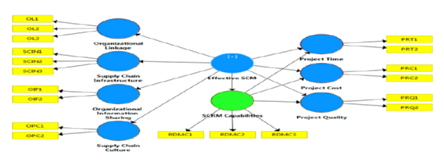


Indian Journal of Science and Technology
DOI: 10.17485/IJST/v15i12.2194
Year: 2022, Volume: 15, Issue: 12, Pages: 505-517
Original Article
Sajal Kumar Ghosh1,2*, Ashok Kumar Sar3
1Sr. Manager, Rail Vikas Nigam Limited (A Govt. of India Enterprise under Ministry of Railways), Bhubaneswar, Odisha, India
2Research Scholar, Kalinga Institute of Industrial Technology Deemed to be University, Bhubaneswar, Odisha, India
3Professor, Strategic Management, KSOM, Kalinga Institute of Industrial Technology Deemed to be University, Bhubaneswar, Odisha, India
*Corresponding Author
Email: [email protected]
[email protected]
Received Date:26 November 2021, Accepted Date:23 February 2022, Published Date:25 March 2022
Objectives: To investigate the impact of effective Supply Chain Management (SCM) on construction project performance measured by project success criteria and on Supply Chain Risk Management (SCRM) capabilities. The study also aims to examine the mediating role of SCRM capabilities on the relation between effective SCM and project success criteria in an uncertain situation like COVID-19. Methods: The investigation was conducted on survey data received from 134 project practitioners from rail construction projects in India by the Partial Least Square Structural Equation Modeling (PLS-SEM) technique using Smart PLS3. Findings/Results: Results revealed a significant positive linkage between effective SCM and construction project success criteria of time, cost, quality, and also with SCRM capabilities. The findings also confirmed the mediating role of SCRM capabilities on the relation between effective SCM and project time and cost. However, no mediating role in the relationship between effective SCM and project quality was observed. Application: Findings will help in sensitizing construction project professionals on the importance of effective SCM and developing SCRM capabilities to make projects a success even in uncertain supply chain situations. The findings also reinforced the applicability of the Resource-based view and paradox theory in understanding Supply chains. Novelty: This research had used three project success criteria as dependent variables instead of using overall project success as done in earlier studies in the project management and the SCM arena.
Keywords: Supply Chain Management (SCM); Supply Chain Risk Management (SCRM); Railway Construction Project; Project Success; PLS-SEM
© 2022 Ghosh & Sar. This is an open-access article distributed under the terms of the Creative Commons Attribution License, which permits unrestricted use, distribution, and reproduction in any medium, provided the original author and source are credited.
Published By Indian Society for Education and Environment (iSee)
Subscribe now for latest articles and news.